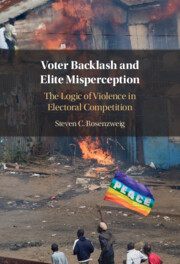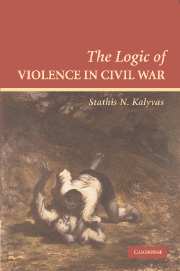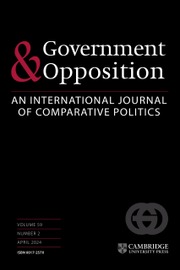Voter Backlash and Elite Misperception
The Logic of Violence in Electoral Competition
$110.00 USD
- Author: Steven C. Rosenzweig, Boston University
- Date Published: May 2023
- availability: This ISBN is for an eBook version which is distributed on our behalf by a third party.
- format: Adobe eBook Reader
- isbn: 9781009354868
Find out more about Cambridge eBooks
$
110.00 USD
Adobe eBook Reader
Other available formats:
Hardback
Looking for an inspection copy?
This title is not currently available on inspection
-
Existing theories of election-related violence often assume that if elites instigate violence, they must benefit electorally from doing so. With a focus on Kenya, this book employs a wide array of data and empirical methods to demonstrate that - contrary to conventional wisdom - violence can be a costly strategy resulting in significant voter backlash. The book argues that politicians often fail to perceive these costs and thus employ violence as an electoral tactic even when its efficacy is doubtful. Election-related violence can therefore be explained not solely by the electoral benefits it provides, but by politicians' misperceptions about its effectiveness as an electoral tactic. The book also shows that violence in founding elections - the first elections held under a new multiparty regime - has long-lasting effects on politicians (mis)perceptions about its usefulness, explaining why some countries' elections suffer from recurrent bouts of violence while others do not.
Read more- Draws on cross-national and sub-national quantitative analysis, qualitative interviews with politicians and voters, and experiments conducted in parallel with both voters and politicians
- Offers an important corrective to existing literature, which tends to underemphasize the costs of election-related violence
- Highlights new approaches for more effectively reducing election violence in Kenya and around the world
Reviews & endorsements
'Do politicians benefit from using violence against voters? Prevailing theories assume that violence works, but this meticulously executed book suggests otherwise, showing that violence does not help and may even hurt parties and candidates. The book argues that elite misperceptions explain why politicians use violence regardless, and presents sophisticated evidence for voters and politicians in Kenya to support this claim. This interesting twist on the logic of violence in electoral competition will inspire scholarship for years to come.' Ursula Daxecker, University of Amsterdam
See more reviews'With an extremely important new book on election violence, Rosenzweig documents a disconnect between elite perception and citizen opinion, moving us much closer to understanding how to meaningfully reduce election violence. He finds that strategies used in founding elections play an outsized role in determining what 'works' to win elections such that some countries fall into a more violent pattern, and that politicians do not know the degree to which election violence is highly unpopular. Together, these findings suggest that politicians can be convinced that peaceful elections are in their own best interest at the ballot box. Such persuasion away from violence, driven ultimately by the unpopularity of election violence among voters, has the potential to create a new and more stable peace.' Susan Hyde, University of California, Berkeley
'This highly compelling book is important in both scholarly and substantive terms, as it provides a rigorous demonstration of the cost of electoral violence to perpetrators. This is a message that needs to get out to as many people as possible, to minimize the use of violence as an electoral tool.' Sarah Birch, King's College London
'Rosenzweig's contribution to theory is novel and important … His empirical strategy is rich, detailed, and multifaceted, demonstrating the best of contemporary comparative politics that combines deep case knowledge, microlevel data collection, and careful attention to inference with clearly delimited scope conditions and attention to broader implications. With its careful attention to detailed technical matters while achieving readability and clarity, [the book] is also a masterclass for PhD students wanting to learn how to successfully turn dissertations into first books. I highly recommend this book to students and scholars of contemporary democratic politics.' James D. Long, Perspectives on Politics
Customer reviews
Not yet reviewed
Be the first to review
Review was not posted due to profanity
×Product details
- Date Published: May 2023
- format: Adobe eBook Reader
- isbn: 9781009354868
- availability: This ISBN is for an eBook version which is distributed on our behalf by a third party.
Table of Contents
1. Introduction
2. Election-Related Violence in Kenya and Around the World
3. Theorizing Election-Related Violence: Toward a Theory of Elite Misperception
4 Violence and Election Outcomes
5. How Violence Affects Voting: Coercion, Persuasion, and Backlash
6. Elite Misperception and Election-Related Violence
7. Voter Backlash, Elite Misperception, and Violence Beyond Kenya
8. Conclusion.
Sorry, this resource is locked
Please register or sign in to request access. If you are having problems accessing these resources please email [email protected]
Register Sign in» Proceed
You are now leaving the Cambridge University Press website. Your eBook purchase and download will be completed by our partner www.ebooks.com. Please see the permission section of the www.ebooks.com catalogue page for details of the print & copy limits on our eBooks.
Continue ×Are you sure you want to delete your account?
This cannot be undone.
Thank you for your feedback which will help us improve our service.
If you requested a response, we will make sure to get back to you shortly.
×






